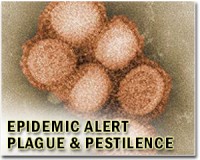| . |  |
. |
Beijing (AFP) Oct 24, 2009 China's agriculture ministry has announced that an epidemic of swine disease that killed more than 80,000 pigs in 2007 has emerged in parts of the country. An outbreak of pathogenic blue-eared pig disease, also known as porcine reproductive and respiratory syndrome, has appeared in five areas of China, the ministry said in a statement posted on the central government website. But the overall swine disease situation in China was stable, the ministry said Friday, compared with 2007, when blue-eared pig illness killed over 80,000 pigs, led to the culling of 235,000 others and set pork prices rocketing. "So far this year, the overall swine disease situation in China remains stable, and in particular, the scope of highly-pathogenic blue-eared pig disease has significantly shrunk," the statement said. Until October 20, just under 3,300 pigs had died from the disease and 7,724 had been culled.
earlier related report Health Minister Klaus Theodor Schroder said he was expecting the spread of H1N1 infections to move more rapidly in the coming weeks and months, and proper vaccination was essential. "The most effective protection against this infectious illness, this new flu, is vaccination," the minister said at a news conference. "We are hoping for a high level of participation in the vaccination programme -- it is imperative," he said, adding that he expected "a more rapid and intense spread of infections in the coming weeks and months". "The weather in autumn and winter will encourage the spread of the virus and increase the risk of infection," Schroder said. Vaccinations in Germany will be offered from Monday, with high-risk groups such as medical staff given priority. The country has so far seen 25,000 H1N1 cases, according to the Robert-Koch public health research institute. Revelations in the press that top officials and other essential workers would get a vaccine with fewer side effects than the one offered to the general public caused an outcry this week. Schroder said there were no "better or worse vaccines in Germany". Recent opinion polls here have suggested that Germans are not overly concerned about the flu, which appears to have killed only two people to date in the country. An Emnit poll said 59 percent of Germans had no fear of the flu. Elsewhere in Europe, swine flu immunisation programmes have already begun in Britain, Belgium, Sweden and Italy. Germany's neighbour the Czech Republic reported its first death from the H1N1 virus on Thursday. Share This Article With Planet Earth
Related Links Epidemics on Earth - Bird Flu, HIV/AIDS, Ebola
 AIDS: Are the wilderness years over for vaccine research?
AIDS: Are the wilderness years over for vaccine research?Paris (AFP) Oct 21, 2009 Scientists looking for a vaccine against the AIDS virus can be forgiven for wondering at times whether they made the right career decision. For more than a quarter-century, their quest has been littered with setbacks while colleagues who work on HIV treatment have been showered with success. Promising avenues have led to dead ends and long, costly trials of prototypes have ended in ... read more |
|
| The content herein, unless otherwise known to be public domain, are Copyright 1995-2009 - SpaceDaily. AFP and UPI Wire Stories are copyright Agence France-Presse and United Press International. ESA Portal Reports are copyright European Space Agency. All NASA sourced material is public domain. Additional copyrights may apply in whole or part to other bona fide parties. Advertising does not imply endorsement,agreement or approval of any opinions, statements or information provided by SpaceDaily on any Web page published or hosted by SpaceDaily. Privacy Statement |